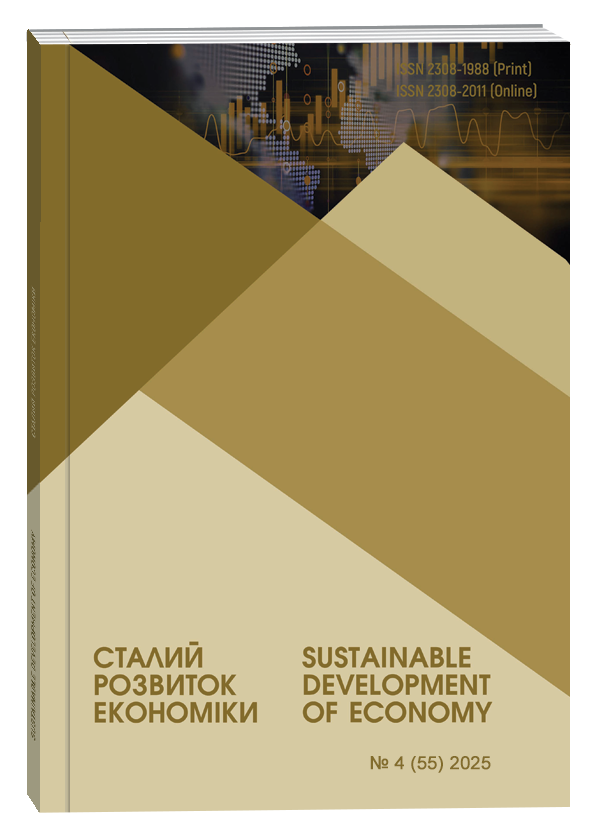DIGITALIZATION AS A SOCIO-ECONOMIC PHENOMENON AND DRIVER OF SUSTAINABLE DEVELOPMENT
Abstract
SWOT analysis of stimulating (internal and external) and destabilizing (internal and external) factors of the dynamics of digitization and digitalization of the economy in Ukraine has been carried out, based on the results of which three possible scenarios of the development of digitalization and the digital economy of the country were predicted: Conservative (inertia model), Moderate (evolutionary model) and Rapid growth (forced model). For the functioning of the social and economic system of Ukraine according to the third scenario, a set of key performance indicators (Key Performance Indicators, KPI) has been proposed for practical use, which are divided into general economic, IT industry, digital infrastructure, financial sector, business, labor resources, social sphere, public administration. The practical significance of the obtained results is that the scientific developments, conclusions and practical recommendations of the author have been used at the national level by the Council of Entrepreneurs under the Cabinet of Ministers of Ukraine and the State Employment Center of Ukraine in the plan of measures to implement innovative activities for the period until 2030. Digitalization and the development of the digital economy pose serious risks of increasing the number of outsiders for individual enterprises and households in the global and national economic systems. This can lead to increased social costs and narrowing opportunities for socio-economic development. Under such conditions, the new doctrine is the structuring and further development of the social economy, which will complement the traditional economy and the social protection system, based on the development of a set of social enterprises. The social economy attracts outsiders to economic life, develops the social responsibility of business, while forming new models of business activity, when the decisive importance is not profit, but social protection of workers and increasing their incomes. Socially oriented enterprises in the social economy are a new organizational and legal form of doing business.
References
Chaliuk Y., Dovhanyk N., Kurbala N., Komarova K., Kovalchuk N. The digital economy in a global environment. AD ALTA-jornal of Interdisciplinary Research. 2021. Vol. 17(1). Pp. 143-148.
Novikova O., Pankova O., Chaliuk Y., Kasperovich O. The Potential of Digitalization and Social Dialogue in Ensuring Post-Pandemic Labour's Market Sustainability: Priorities for Ukraine. Studies of Transition States and Sosieties. 2021. Vol. 13 (2). Pp. 70-85.
Rozskazov A., Chaliuk Y., Anishchenko V., Smal I., Matviichuk O. Matviichuk. Implementing of the COM-B Model in In-Service Training of Civil Servants as a Prerequisite for Effective Public Governance. Academic Journal of Interdisciplinary Studies. 2021. Vol. 10 (3). Рр. 241–252.
Туль С.І., Шкурупій О.В. Диджиталізація світового ринку праці : монографія. Полтава: ПУЕТ, 2020. 302 с.
Український інститут майбутнього. Україна 2030Е – країна з розвинутою цифровою економікою. URL: https://strategy.uifuture.org/kraina-z-rozvinutoyu-cifrovoyu-ekonomikoyu.html#6-2-1 (дата звернення: 18.06.2025).
Центр Разумкова. Цифрова економіка: тренди, ризики та соціальні детермінанти. Київ: Заповіт, 2020. 274 с.
World Employment and Social Outlook: Trends 2025. Geneva: ILO. 2025. P. 84.
Global Economic Prospects, January 2025. Washington, DC: World Bank. 2025. P. 87.
World Bank Annual Report 2024. Washington, DC: World Bank. 2024. P. 153.
Multiannual financial framework 2014-2020. Luxembourg: Publications Office of the European Union. 2021. P. 24.
Chaliuk Y., Dovhanyk N., Kurbala N., Komarova K., Kovalchuk N. (2021). The digital economy in a global environment. AD ALTA-jornal of Interdisciplinary Research, vol. 17(1), рp. 143-148.
Novikova O., Pankova O., Chaliuk Y., Kasperovich O. (2021). The Potential of Digitalization and Social Dialogue in Ensuring Post-Pandemic Labour's Market Sustainability: Priorities for Ukraine. Studies of Transition States and Sosieties, vol. 13 (2), рp. 70-85.
Rozskazov A., Chaliuk Y., Anishchenko V., Smal I., Matviichuk O. (2021). Implementing of the COM-B Model in In-Service Training of Civil Servants as a Prerequisite for Effective Public Governance. Academic Journal of Interdisciplinary Studies, vol. 10 (3), рр. 241–252.
Tulʹ S.I., Shkurupiy O.V. (2020). Dydzhytalizatsiya svitovoho rynku pratsi: monohrafiya. [Digitalization of the global labor market: a monograph]. Poltava: PUYET, 302 р. (in Ukrainian)
Ukrayinsʹkyy instytut maybutnʹoho. Ukrayina 2030E – krayina z rozvynutoyu tsyfrovoyu ekonomikoyu [Ukrainian Institute of the Future. Ukraine 2030E – a country with a developed digital economy]. Available at: https://strategy.uifuture.org/kraina-z-rozvinutoyu-cifrovoyu-ekonomikoyu.html#6-2-1. (in Ukrainian) (accessed June 18, 2025)
Tsentr Razumkova (2020). Tsyfrova ekonomika: trendy, ryzyky ta sotsialʹni determinanty [Digital economy: trends, risks and social determinants]. Kyiv: Zapovit, 274 р. (in Ukrainian)
World Employment and Social Outlook: Trends 2025. Geneva: ILO. 2025. 84 р.
Global Economic Prospects, January 2025. Washington, DC: World Bank. 2025. 87 р.
World Bank Annual Report 2024. Washington, DC: World Bank. 2024. 153 р.
Multiannual financial framework 2014-2020. Luxembourg: Publications Office of the European Union. 2021. 24 р.


